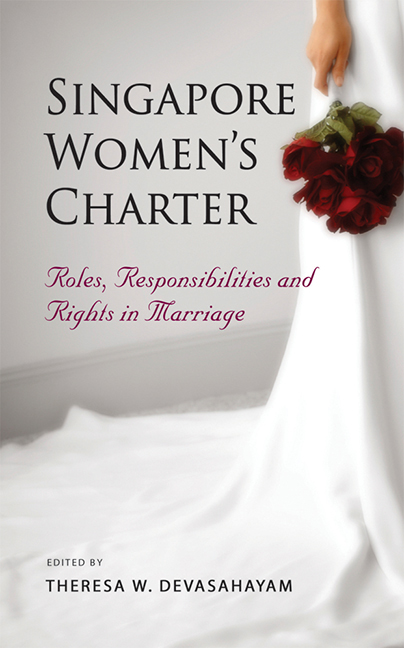Book contents
- Frontmatter
- Contents
- Contributors
- Foreword
- Keynote Address
- 1 Legal Mechanisms for Protecting Women's Rights: Examples from Southeast Asia
- 2 The Women's Charter, 1961: Where We Were Coming From and How We Got There
- 3 Significant Provisions in the Women's Charter
- 4 A Lawyer's Perspective on How Divorcees View the Women's Charter
- 5 “The Morning After”: Understanding and Exploring the Psychosocial Impact of the Women's Charter on Families Experiencing Domestic Violence
- 6 Epilogue: Some Thoughts on Protecting Women's Rights in the Family and Beyond
- Index
6 - Epilogue: Some Thoughts on Protecting Women's Rights in the Family and Beyond
Published online by Cambridge University Press: 21 October 2015
- Frontmatter
- Contents
- Contributors
- Foreword
- Keynote Address
- 1 Legal Mechanisms for Protecting Women's Rights: Examples from Southeast Asia
- 2 The Women's Charter, 1961: Where We Were Coming From and How We Got There
- 3 Significant Provisions in the Women's Charter
- 4 A Lawyer's Perspective on How Divorcees View the Women's Charter
- 5 “The Morning After”: Understanding and Exploring the Psychosocial Impact of the Women's Charter on Families Experiencing Domestic Violence
- 6 Epilogue: Some Thoughts on Protecting Women's Rights in the Family and Beyond
- Index
Summary
Women's rights in countries the world over are protected by a gamut of laws. There are pieces of legislation enabling women's participation in the public sphere or civil society and the arenas of education, mass media, market economy, and politics. There are also laws protecting women's rights in the private sphere of the family. Family practices on the role and authority of the father in the family, obligations and duties of both husband and wife, divorce, inheritance rules, child custody, and other related issues are all governed by laws. Civil family and marriage legislation found in the different countries in Southeast Asia are about correcting the asymmetrical relationship between men and women in their personal lives — an arena where intervention is evidently problematic because it involves interfering in people's private lives.
The Singapore Women's Charter is no different from numerous other marriage and family legislation found in countries in the region. The Charter is about women and men — their roles, responsibilities, and rights — in the context of family and marriage. Since its promulgation, the Women's Charter has been a landmark legislation, safeguarding women's rights in matters related to marriage, divorce, matrimonial assets, maintenance, and custody of children. Although called the Women's Charter and commonly perceived to be pro-woman, the legislation is gender-neutral, protecting as it does the rights of both women and men in a marital relationship.
In spite of its efficacy, the Women's Charter is not without imperfections. While it protects a spouse, former spouse, child, stepchild, adopted child, parents, parents-in-law, and any other relative or incapacitated individual who is regarded by the court as a member of the family, couples in de facto or “informal marriages” are excluded. Another limitation of the Charter is that only the victim of family violence can apply for a protection order; it has been found that in many instances, however, the victim often believes she cannot help herself and, as a result, does not take the necessary action to end the abusive relationship.
- Type
- Chapter
- Information
- Singapore Women's CharterRoles, Responsibilities and Rights in Marriage, pp. 179 - 186Publisher: ISEAS–Yusof Ishak InstitutePrint publication year: 2011



